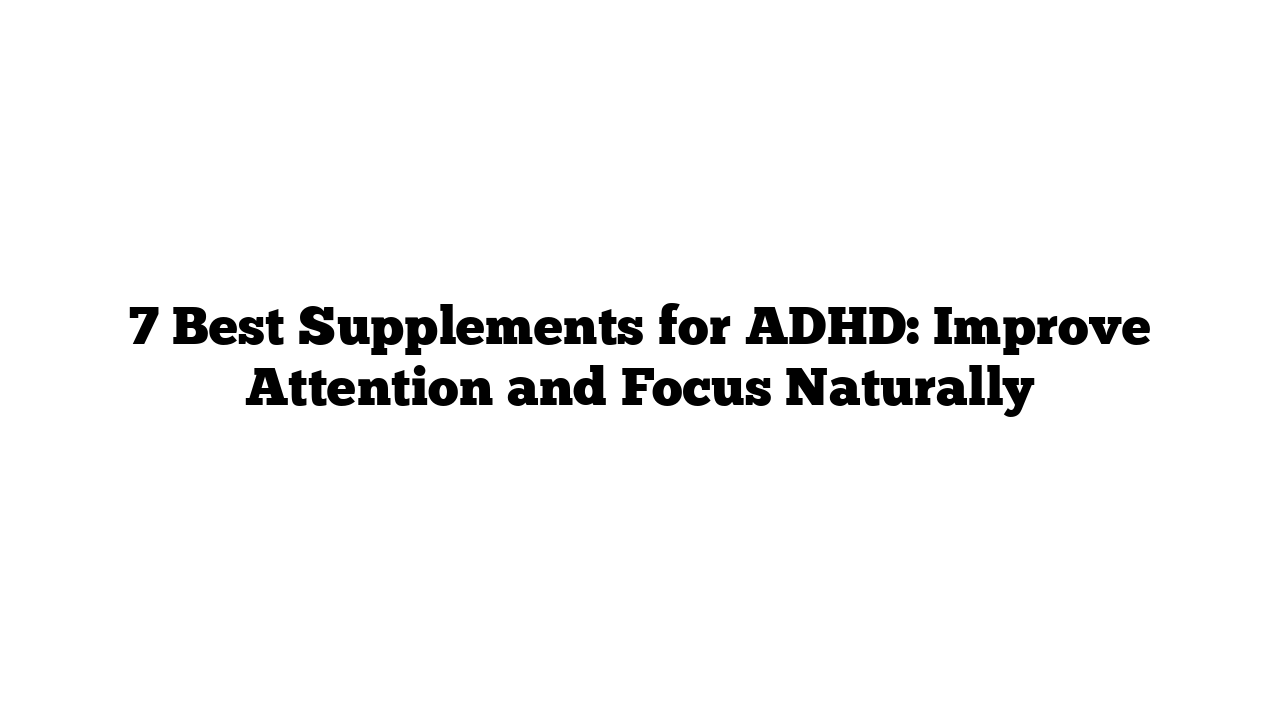If you’re looking to enhance focus, attention, and cognitive function without relying solely on medications, certain natural supplements can help. These supplements support brain health and may assist in managing ADHD symptoms, especially when combined with a balanced lifestyle. Here’s a guide to some of the best supplements for ADHD and how they can benefit you or your child.
1. Magnesium
Role in ADHD: Magnesium is essential for over 300 biochemical processes in the body, including brain function. Magnesium glycinate and magnesium l-theanine are particularly effective forms for improving focus and calming the brain.
Benefits: Magnesium can help reduce hyperactivity, improve mood, and alleviate stress. For those with ADHD, it can enhance attention and focus by supporting overall brain energy levels.
2. Vitamin D
Role in ADHD: Low levels of vitamin D have been linked to issues with attention and impulse control. Vitamin D supports the brain’s use of magnesium, making it crucial for attention and mood stability.
Benefits: Aside from improving focus, vitamin D is vital for immune function, mood regulation, and neurotransmitter health. Low vitamin D levels can lead to mental fatigue and poor impulse control, making it beneficial for those with ADHD to maintain healthy levels year-round.
3. B Vitamins
Role in ADHD: B vitamins, including B6 and B12, play essential roles in brain health. B12 is critical for the nervous system, while B6 supports neurotransmitter production, directly influencing attention and focus.
Benefits: Regular intake of B vitamins may improve energy levels, enhance focus, and support cognitive function. These vitamins can be especially helpful for individuals who experience fatigue or stress, both of which can worsen ADHD symptoms.
4. Essential Fatty Acids (EFAs)
Role in ADHD: EFAs, particularly omega-3s, are essential for brain health. Studies show that low levels of EFAs are often found in individuals with ADHD.
Benefits: Omega-3 fatty acids support executive functioning, impulse control, working memory, and attention span. Regular intake of EFAs, especially DHA and EPA, may improve cognitive performance and reduce impulsivity.
5. Zinc
Role in ADHD: Zinc is known for its role in supporting the immune system, but it also plays a key role in mood and impulse regulation.
Benefits: Low zinc levels are associated with poor attention, hyperactivity, and impulsive behavior. Adding zinc to the diet may support cognitive function and attention span. However, be sure to take zinc with food, as it can sometimes cause stomach discomfort.
6. Iron
Role in ADHD: Iron is essential for dopamine production, which is crucial for attention and mood regulation.
Benefits: Iron deficiencies can lead to decreased focus, fatigue, and difficulty with cognitive tasks. By supplementing iron, individuals may see an improvement in attention, memory, and energy levels.
7. DMAE (Dimethylaminoethanol)
Role in ADHD: DMAE, a compound found in certain fish like sardines, supports brain health by promoting acetylcholine production, a neurotransmitter important for focus and memory.
Benefits: DMAE can enhance mental clarity, reduce brain fog, and improve concentration. This supplement is often used as an alternative to stimulant medications due to its cognitive benefits and minimal side effects.
For anyone considering these supplements, it’s essential to consult with a healthcare provider first, especially if ADHD medication is already in use. Natural supplements can be highly effective for managing symptoms, but combining them with other lifestyle changes, like a balanced diet, regular exercise, and quality sleep, will further enhance their effectiveness.
